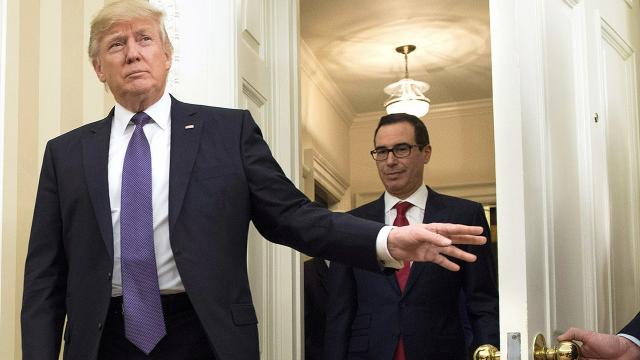
In the early 2000s, banks successfully sued to stop Iowa from limiting their ability to charge ATM fees to non-customers. They also fought off states’ attempts to stop them from charging non-customers to cash checks drawn on the banks’ accounts. In another case, they stopped California from forcing two banks to conduct audits of their own residential mortgages.
What do all these cases have in common? The winning argument in each was that states had no right to impose their laws on federally regulated national banks. And the man who helped make that powerful argument was Keith Noreika — President Trump’s pick to head the federal agency that oversees national banks.
Noreika, a prominent Washington attorney who specializes in financial regulatory law, has made a career out of representing banks as they sought to fight back consumer-friendly state regulations and class-action lawsuits accusing banks of deceptive practices.
He is now the acting head of the Office of the Comptroller of the Currency, a position he can serve for 130 days without Senate approval and during which he does not have to abide by stricter ethics rules governing permanent appointees.
As head of the OCC, Noreika will be well-positioned to lighten regulations on banks — without the need for Congress to pass legislation.
Among the targets may be the 2010 Dodd-Frank Wall Street overhaul, which made it easier for states to hold national banks accountable. Noreika has criticized the law’s burdens, while Trump has called it “horrendous.”
Under Dodd-Frank, the head of the OCC has broad power to review and preempt states’ consumer finance laws.
“The first way to change the regulations is to put in regulators who will propose to stop enforcing them,” said Andy Green, a former Democratic Senate staffer who helped craft the 2010 law and now works at the liberal Center for American Progress.
Noreika’s ascension fits into a broader pattern of Trump administration appointees. Many of them have worked to influence the same agencies they’ve now been assigned to lead. And while Trump has been slow to name people to positions that require Senate confirmation, he has been quick to install officials out of public view.
Through an OCC spokesman, Noreika declined to be interviewed. But he said in a statement:
“I am proud to have had an effective law practice where I represented clients of all types — banks, institutions, individuals, and a large labor union.”
He added:
“I do think that ten years after the crisis and seven years after the passing of Dodd-Frank, now is a good time to take stock of the rules implemented and actions taken to ensure the nation has the right sense of balance and coherence in regulating financial institutions.”
(Read his full statement here.)
Noreika’s appointment has raised the ire of Democratic lawmakers.
“You have chosen to replace the current head with an acting head who is unvetted, has obvious conflicts of interest, and lacks the experience to run an agency that employs almost 4,000 individuals,” seven Democratic Senators wrote in a letter to Treasury Secretary Steven Mnuchin on Thursday.
Noreika is following in the footsteps of his mentor, John Dugan, who worked with Noreika at the corporate law firm Covington & Burling — before himself leaving to head the OCC from 2005 to 2010.
Under Dugan, the OCC was criticized as being too friendly to banks in the face of widespread lending abuses that fueled the financial crisis. While Noreika now heads up the OCC, Dugan is back at Covington, where his bio says he “advises clients on a range of legal matters affected by significantly increased regulatory requirements resulting from the financial crisis.”
Some say it’s too early to draw any conclusions on how Dugan’s protégé will run the agency.
“I don’t think you should assume that what a lawyer argues for a client is indicative of how he or she would react when you’re administering the law,” said H. Rodgin Cohen, senior chairman of Sullivan & Cromwell, a prominent corporate law firm.
Consumer advocates are particularly concerned about Noreika’s frequent reliance on the argument that federal banking laws and OCC regulations trump state laws — a concept known as preemption.
In 2005, when Noreika became a partner at Covington, the firm noted that “many of Mr. Noreika’s cases have challenged the validity of state and local laws as preempted by the federal banking laws” and listed Wells Fargo and Bank of America as prominent clients.
ProPublica identified more than a dozen such cases filed in federal court from 2000 through 2005. Most were dismissed or settled in banks’ favor.
“That’s a real problem,” said Lauren Saunders, associate director of the National Consumer Law Center in Washington, D.C. “States often have laws that protect consumers in areas where there are no national laws.”
Banking lawyers say it only makes sense to give precedence to federal banking laws. Otherwise, national banks would end up dealing with 50 different regulators rather than one — the OCC. That was the whole point behind Congress’ creation of the agency during the Civil War, when states’ conflicting regulations made banking and commerce more difficult.
But in the years before the financial crisis, as abuses in the mortgage-lending markets began to surface, the OCC was slow to act. States did act. Between 1999 and 2007, North Carolina and about 30 other states passed laws targeting predatory lending practices.
The OCC, meanwhile, adopted sweeping regulations that prevented those laws from applying to national banks and extended that protection to the banks’ state-chartered subsidiaries. In 2008, then-New York Gov. Eliot Spitzer accused the agency of embarking “on an aggressive and unprecedented campaign to prevent states from protecting their residents.”
At the time, Dugan brushed off the criticism. “Almost everyone who has paid attention to the subprime lending crisis has concluded that OCC-regulated national banks were not the problem,” he said in a statement responding to Spitzer.
But two separate inquiries — the Financial Crisis Inquiry Commission and a report by the U.S. Senate Banking Committee — disagreed. The commission concluded that the OCC’s preemption of state laws ended up “preventing adequate protection for borrowers and weakening constraints” on risky mortgages.
The banks used the OCC to engage in “regulatory arbitrage,” said Arthur Wilmarth, a professor at the George Washington University Law School.
Dugan did not return phone calls but said in an email, “I disagree categorically with Wilmarth.” He referred his testimony to the crisis investigators, in which he said the financial crisis was “not caused by federal preemption of state mortgage lending laws.” Instead, Dugan said, “the root cause of the mortgage crisis was exceptionally weak underwriting standards.”
In 2007, as Dugan presided over the OCC, Noreika and his Covington colleagues won the biggest preemption victory of all, Watters vs. Wachovia Bank. The case evolved from separate federal lawsuits involving banks that had sought to shield their subsidiaries from state laws and subsequently faced collapse or fell into legal trouble for their business practices — Wachovia, National City Bank of Cleveland and Wells Fargo. Wilmarth advised state banking regulators on the cases.
The cases were merged and went all the way up to the Supreme Court, where Noreika argued that state laws didn’t apply to subsidiaries of national banks like Wachovia. In a 5-3 vote, the high court agreed.
Preemption became an even bigger issue after the 2008 collapse of several big banks, including Wachovia. Local governments tried to sue banks for alleged misdeeds, but again were blocked by preemption.
By then, Congress was working on Dodd-Frank, and preemption was a hotly debated area of reform. One of the changes Congress enacted as part of the law was to negate the effect of the Supreme Court decision that Noreika had litigated. Dodd-Frank also gave local law enforcement authorities more power to bring lawsuits against national banks under state laws. And it created a revised set of rules under which the OCC can review state banking laws to determine if they should be preempted.
The responsibility for those reviews falls to the head of the OCC — now Noreika. He has the power to determine if a state consumer finance law is preempted by federal law.
“He will now have his hand on the preemption button,” said Wilmarth, the George Washington University law professor.
3 WAYS TO SHOW YOUR SUPPORT
- Log in to post comments














